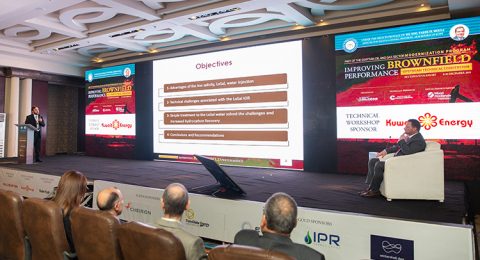In line with the fruitful discussions on ways of enhancing young professionals’ skills and integrating them to the market, the Upstream Technical Convention was concluded with the “People Oriented” workshop, which brought a series of presentations displaying people development initiatives in Egypt.
Shell’s NXplorer
In the first presentation, Nashwa Saleh, Social Investment Manager at Shell, introduced Shell’s NXplorer, a unique program to help prepare future leaders for a complex and interconnected world. The program equips participants with tools and skills to embrace complexity, empowers participants to create a positive change in themselves, locally and globally, and unlocks the STEM Habits of Mind.
“What we have identified at Shell is that globally, young professionals are lacking what we call STEAM Habits of Mind,” Saleh explained. According to her, the concept consists of creative problem solving, improvising, adapting, systems thinking, problem finding and visualizing.
During three- to five-day workshops, trained facilitators work with participants in finding solutions to real world challenges that are relevant to themselves and their communities. Through the program, participants select the issue, learn and apply “NXThinking” to help create ideas and “NXTools” to create future scenarios. Participants continue to develop the project over four to 12 months.
“What we learn with pleasure, we never forget. It was a joyful, interesting experience. It made me be creative and think out of the box, changing the ways I think when facing a problem,” Fatma Sherif, an NXplorer former participant, commented.
Schlumberger’s Technician Development Training Program
As Schlumberger identified the need to increasingly integrate blue-collar labor, the second presentation, presented by Heba Abaza, Training Program Manager at Schlumberger, gave attendees the chance to have a closer look at the company’s Technician Development Training Program, which was designed to bridge the gap between formal university education and the demands of the current labor market.
The program looks at empowering participants to discover their capabilities, strengths and weaknesses to better establish and work toward their career goals, helping reduce unemployment rates. Additionally, Schlumberger aims to build a strong database of qualified technicians to help serve the oil and gas industry, extending its support to multiple industries around Egypt and supporting the country’s vision of growth. “We usually make group interviews with around 30 participants in each group. Once they are selected, they start their training program,” Abaza, stated.
Applicants of up to 25 years of age are considered, and the program is divided in six phases. “They start with a six-week soft skills training. After they finish the six weeks, they move on to phase two, consisting of safety trainings that all of us Schlumberger employees go through when joining the company,” Abaza added. Phase three consists of a five-week job training at the company’s bases, and phase four concludes the program with a debrief and recap. “They also attend something called ‘Train the Trainer’ to pass the knowledge they gained.”
Subsea Development Program
Under the umbrella of the Modernization Program, the third presentation, conducted by Randi Banna, Subsea Engineer at Oil & Gas Skills (OGS), introduced the Ministry of Petroleum’s Subsea Development Program. In its class component, “…the program will cover all the main aspects of the Subsea engineering delivery scope of work, as well as the operational requirements for the life field,” Banna disclosed.
In its practical component, it will offer a rotational program to work in local fabrication shops for three to four weeks per group. Overseas, participants will visit supplier-manufacturing facilities over the course of two weeks, in addition to trips to ongoing projects in collaboration with Subsea installation companies operating on Egyptian projects.
Potential partners consist of international universities, as well as international and local companies. Banna explained that since many international universities developed master programs in petroleum engineering, this creates numerous partnership opportunities between international and local companies and international universities.
Zohr Training Project
Another initiative within the Modernization Program is the Zohr Training Project (ZTP), which was presented by Ahmed Yousry El-Sharkawy, ZTP’s Technical Manager, on the fourth presentation within the “People Oriented” workshop. The project represents an opportunity to provide a role model in the development of human resources, El-Sharkawy stated. “It was sanctioned in October 2016 by Petrobel to ensure the availability of skilled and competent staff for the safest operations of Zohr gas plant.”
The program is designed and operated by OGS in cooperation with Eni Corporate University (ECU), under the supervision of Petrobel. It consists in health, security, and environment (HSE) mandatory training, tailored training path for skilled Petrobel staff, and competence based training path for Zohr qualified trainees.
For example, the tailored training path for skilled Petrobel staff consists of a specific training addressed to 125 selected participants to enhance their existing competencies in order to operate Zohr new process units and technology. El-Shakawy’s presentation on Zohr Training Project closed the “People Oriented” workshop.








